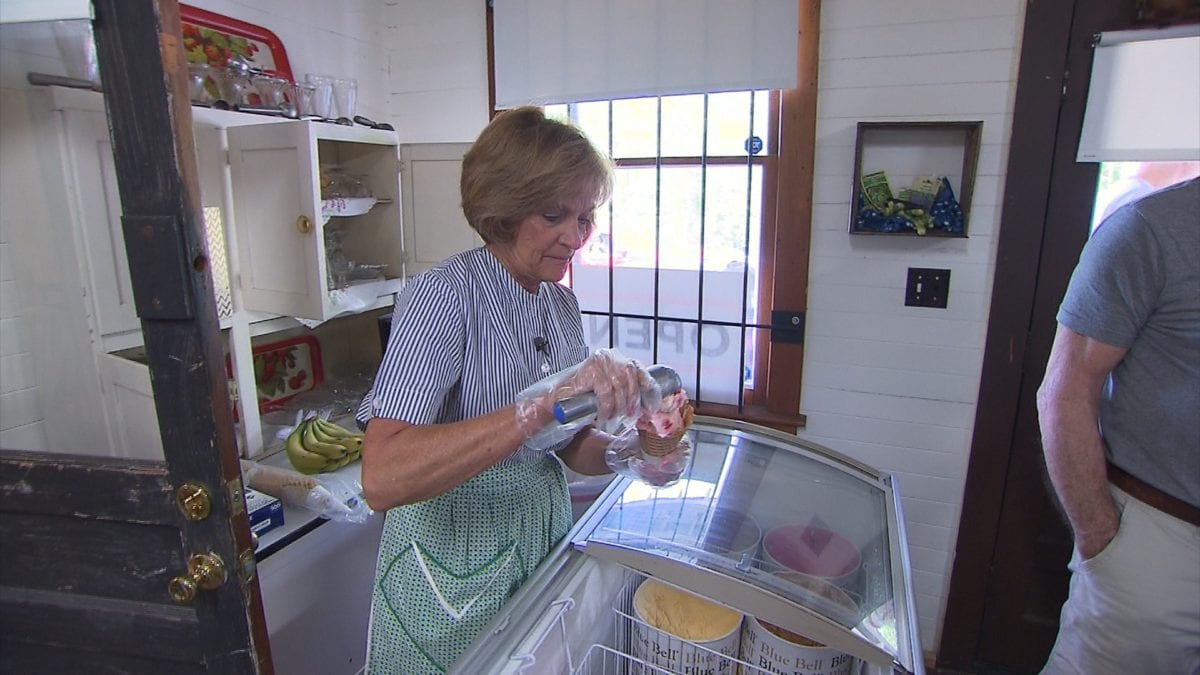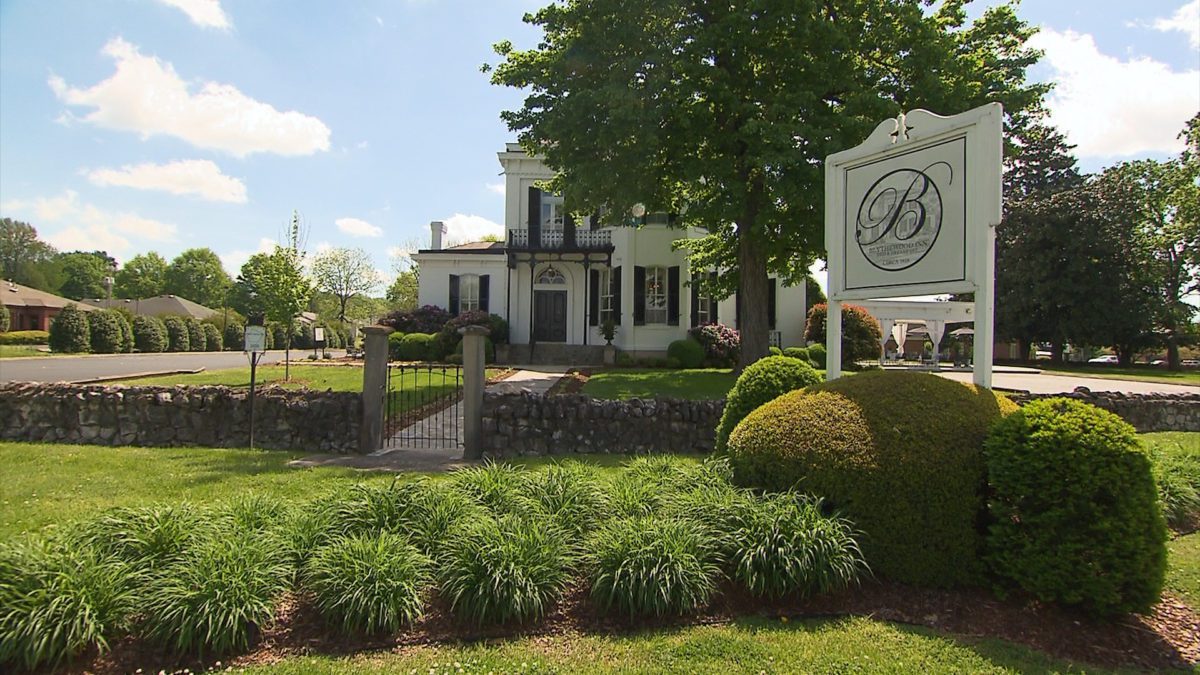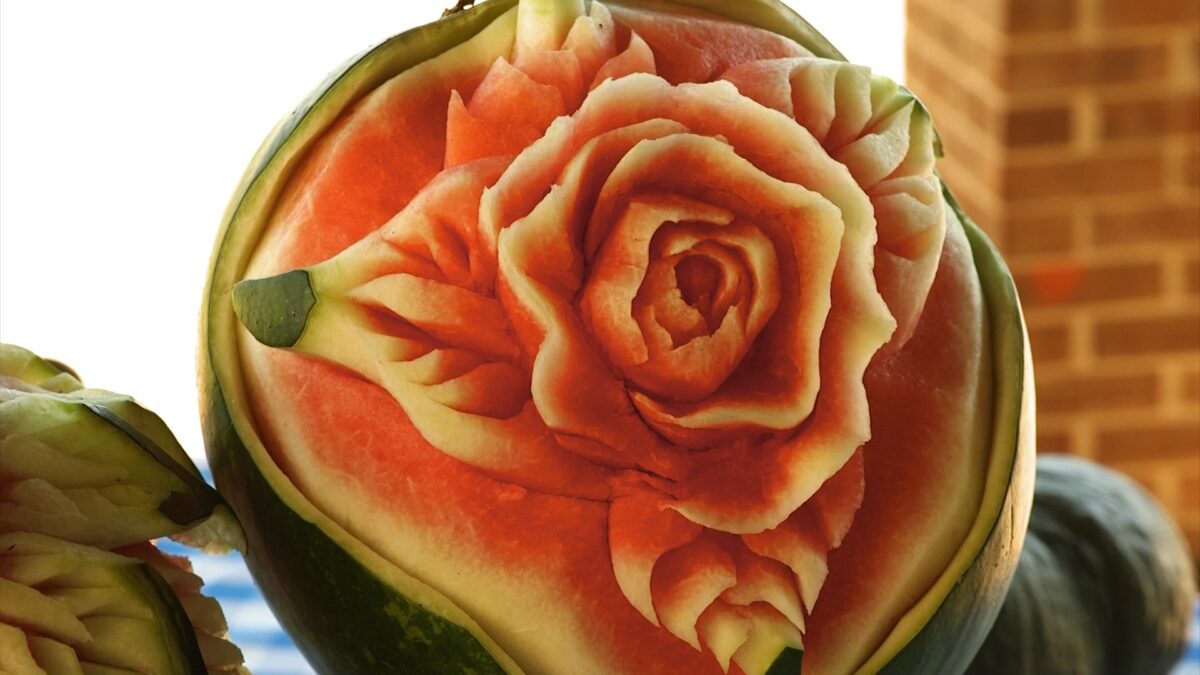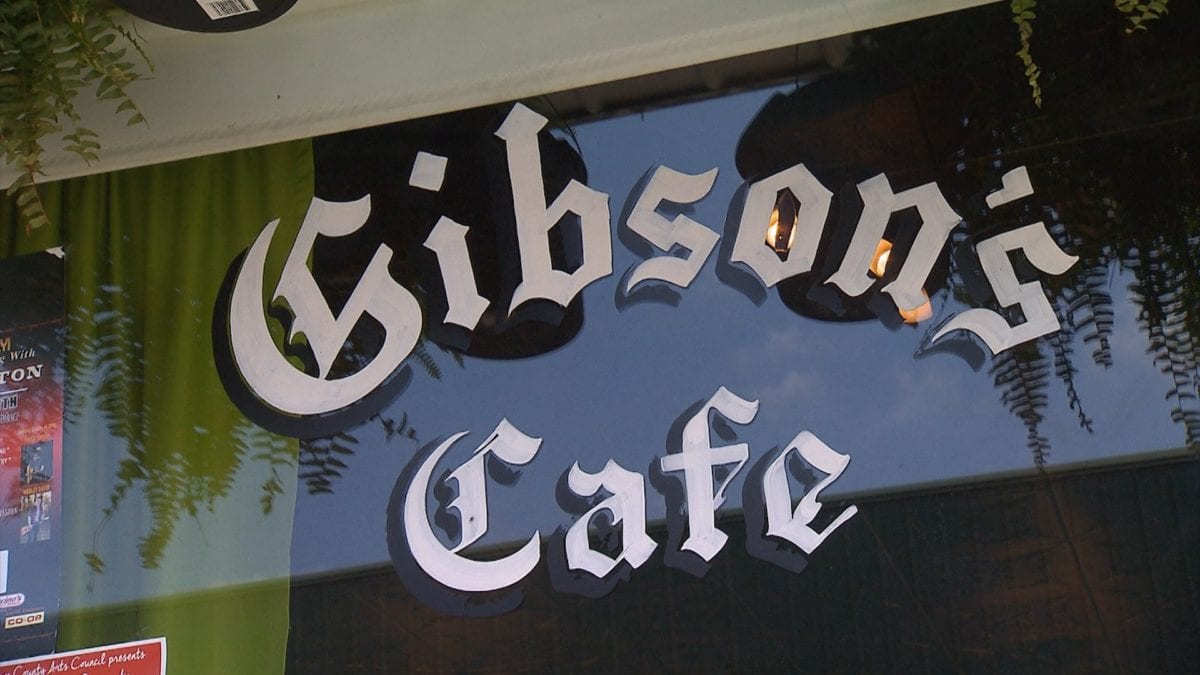Episode 3249
Don't have the PBS App? Click Here
Episode Transcript
- This time on Tennessee Crossroads we explore a 119 year old country store in Putnam County. Then we check in to the Blythewood B&B Inn in Columbia. We'll meet an artist in Jackson, who turns the edible into incredible. Finally, wind up in time for lunch at the Gibson Cafe in Lafayette, that's not La-fayette, by the way. I'm Joe Elmore, welcome again to Tennessee Crossroads. First, a survival story about a family business in Putnam County. A country store to be exact. Well, it was built by Marcia Cole Huffman's great-great-grandfather. Well, it had a date with a wrecking crew until Marcia came to its rescue. Now it's been restored to its former glory and then some. Our destination is on old Highway 70 north, somewhere between Cookeville and Chestnut Mound. Pouring a bag of peanuts into a Coca-Cola, that's a childhood memory of a country store. Now, a lot of people who come here to Baxter and Cole's store have a lot of memories of their own. Just like it was. - It is amazing how people love the store. - [Narrator] Cole's Country Store has been in Marcia Cole Huffman's family since 1900. That's when her great-great-grandfather Dr. Phylander Cole built it and became the first of three generations to run it. Later on, several other individuals leased it. But eventually the old store was abandoned for about 20 years. Then in early 2017, Marcia heard some disturbing news. - "Do you know they're going to tear down the store? "Do you know that the store's up for sale? "It's up for sale for the back taxes." Bottom line, I bought the store 10 minutes before the auction. And I have since had two people tell me that they were going to buy it and tear it down. - [Narrator] So the retired computer scientist was on her way to a new career as a store owner. - When you walked in that front door, the floor had sunk like eight to 12 inches. We had to have new electricity, new water, new, just lots of things that, my sisters came in and said, "Whoa, it looks just like it did years ago. "What did you do?" And I'm going, that's the whole point. - [Narrator] The next question was what to do with it? For a while she and her sisters opened on weekends to sell bologna sandwiches and ice cream. Then one day, Tish Herald stopped by with an idea. - I made a proposal to come and open it as a meat-and-three. - As soon as I found out that her grandparents had run those two country stores and I knew her parents, I just, it was a godsend. She is a godsend, that's what she is. - [Narrator] Soon Tish was using a makeshift kitchen back in the corner to turn out tantalizing meat-and-three dishes five days a week. - It is Tish's store. I mean, I own the building and I come in and visit but she cooks, she manages the store, she does everything. - [Tish] Today, we have chicken casserole, meat loaf, ham, turkey, pinto beans, green beans, cabbage, fried apples, carrots, macaroni and cheese, and stewed potatoes, peach cobbler, strawberry pie, coconut cake. - [Narrator] Customers can't get enough of Tish's corn bread which starts with a hot skillet and peanut oil. - It's another secret, it's peanut oil. Warm the oil before we pour in the corn bread. - [Narrator] And it comes out soft and velvety on top with a little crunch on the bottom. As a special touch, the ladies wear waitress dresses from the 1930s along with cowboy boots. People not only come in to eat, many have brought in things to complement the decor. One visitor brought this long 160-year-old farmhouse table. Another one came in with a decades old original store sign. - Our friends and customers bring things in. It's like a museum now. People will come in and we do have a few antiques for sale. But mostly it's just community, it's a community museum if you will. - I appreciate you opening this place up. - Well, I just couldn't see it being torn down. People come in every day and they talk about how they loved the store and how they grew up here. And how they go to their grandmother's house and they couldn't wait to come by and get a piece of candy or ice cream. I mean, I never expected this. - [Narrator] For now, Marcia divides her time between Huntsville where she used to work and her childhood home, where she's proudly revived a Cole family tradition. - Here you go, sir. - [Man] Oh, thank you, ma'am. - You're very welcome. I had a friend, she's a college friend, and she said, "Why are you doing this?" So she came down and spent a day, and she said, "I know why you're doing it, everyone is happy." I mean, that is the thing that people come to this store, they're happy. And we want you to leave here happy. We want you to have plenty of food. If you don't get enough, tell us, and we'll give you more. - When some people go on vacation, they wanna be on the go and filling every moment with exciting adventures. Then again, there's another group that likes to find time for peace and quiet, reflection and relaxation. Well, if you're in the latter group, you might wanna try checking in to Blythewood Inn in Columbia. Rob Wilds is taken there in our next story. - Even in a smaller city like Columbia, there's always busyness around the sounds of the 21st century in the air. It might be nice to go back to a quieter time. And on this particular street in Columbia, that time-travel trip begins by going up the walk to Blythewood. Blythewood was build back in 1857, and like many homes, it went from family to family, and had many lives as a business. In fact, it was a doctor's clinic owned by Dinah Vire and her husband. When that phase of the house's life ended, and renovations underway, family friend Wayne Swope came along with an idea. - First walked in, like this place is a bed and breakfast. So over a few bottles of wine, we just decided, hey, let's open a bed and breakfast. Little did we know what we're getting into. - [Narrator] Well, after that wine, and owner Dinah Vire won't say exactly how much wine, she agreed to the plan. To her, the house is the star. Each room providing its own highlights for guests who are looking for a gentler time. For instance, the Magnolia room. - It would've probably been the master suite of the day, of the 1857 era. It is still one of our biggest renting space. It is a large bedroom with its own parlor and full bath. It is almost oval with the exception of one corner, so it's, and we've nestled the bed in front of the windows, so it's just breathtaking when you walk in. - [Narrator] Each room has its own personality too. Like, the Scarlet Oak. - [Dinah] It's outfitted a bit more masculine than the other rooms in the house. The deep red color on the walls, nice big bed, king-sized bed. The bath in that room, I do know, for a fact, was added in 1920 to the house. - [Narrator] Not only personality but statements from some of the rooms. Take for instance, the Hawthorne. - [Dinah] It was built probably around 1920, but it was built as the sunporch. So it has black-and-white checked marble solid floor. The bed and the armoire, they're true antiques and they make a statement in the room. They say, "I've stepped back in time "to a more elegant time than we have today." - [Narrator] Which Wayne Swope says appeals to all sorts of guests. - [Wayne] I mean, we get a lot of younger folks that come in that have never experienced such grandeur as this, and to be served on china and silver, it's a whole new experience. Today's lifestyle is much more casual than years past. And so we try to them back in time and let them experience what is was back then. - [Narrator] The house has many places to pause and reflect. A library with books from an era when just about every family could count a set of encyclopedias among its possessions. There's a bar, if you like to have a light-based ship. And if your idea of thoughtful reflection includes a nap, you might take Wayne's recommendation, the Hickory room. - My favorite room is Hickory, upstairs. It's a way away from everyone when everyone is divvying up responsibilities and cleaning the house, I always pick Hickory 'cause I can hide up there and no one can find me. Now, I'm telling all my secrets. Like that homemade strawberry bread that Miss Dinah makes? - [Woman] Yeah, I'm enjoying the peach. - Good. - [Dinah] We have plenty more, so please help yourself. - [Narrator] There's at least one thing you don't wanna stay away from when you come to Blythewood, and that is the breakfast part of the bed and breakfast. That's another one of Dinah's duties around the place, and she really enjoys it. - [Dinah] I've cooked all my life it seems, so it seemed to be a natural fit. I grew up socializing too, entertaining, my husband and I love to entertain too. So, food was our life. So it makes sense that I'm in the kitchen and socializing with the guests. - [Narrator] And guests let Dinah know what they like. - Even though the website has pictures, the pictures just do not do justice to the house. And when they walk in the front door, it's a wow factor. And when they leave, that's often the comments. But, they also comment about how comfortable the beds are and how comfortable they felt. And how nice it was to get to know the staff and the breakfast. I have some that have been here four, five times. And if I try to change the menu, they say, "No, no, no, we want just what we had before." - [Narrator] Not just the same food, no, but the same traditions and hospitality here at Blythewood Inn in Columbia. - Thanks Rob. There's nothing like biting into an ice cold watermelon on a hot day. As a matter of fact, fruit of any kind can be a treat to the taste buds. Recently, Ed Jones met an artist in Jackson who takes fruit and turns it into a treat for the eyes. - Fruit is so beautiful by itself, especially if you can take advantage of the layers. And the story goes that Michelangelo, they ask you, "How did you do that angel in that piece of marble?" Of course, I didn't say it with a southern accent. So Michelangelo's, "Oh, no, the angel was already inside. "All I did was liberate it." - [Narrator] Carl Jones has been liberating beautiful works of art hidden in fruit for more than a decade. But when he started this journey, Carl was the one in need of liberation from a lifestyle that was slowly killing him. - I was in the restaurant business for 30 years. Back about 12 years ago, I was having trouble with my blood pressure and it was my heart actually. And it, went to a cardiologist, he said, "You're pretty stressed out." I said, "Yeah, tell me about it." He says, "Well, you need to slow down." You know, "How do I slow down?" He said, "Get a hobby." I went back to my office that night and in a packet was knife, a little carving knife that I had bought maybe two years earlier at a catering conference I was at and saw someone carving. So I thought that, well, that's kinda an answer. So I went and got a little small melon and brought it to my desk, pulled out the knife out of the packet, started trying to carve a flower into it, well, it fell in. So I learned my first technique, and that's to put my finger right here to gauge the depth. So my first mistake led to my first technique. - [Narrator] It would be many more mistakes. But as Carl's skill began to improve, so did his health. My blood pressure is greatly improved. And the stress is virtually gone. That's the mindfulness of this art. And mindfulness is what leads to stress reduction and relaxation. - [Woman] You do beautiful work. - Thank you. - That is just gorgeous. - Thank you. I think part of it is while your carving, you have all these people walking up to you telling you how great you are. - Well, these are lovely, and your reputation preceded you, and I can see why. - Thank you. You know, I can do birds, I can do pretty much anything. I do freehand, so it just means that I just start carving and see what comes out. I do a lot of flowers, that's how you get good at doing flowers, is doing a lot of them. And that's the most requested, is for roses or somebody will look at a picture and say, "Oh, make me that." - [Woman] Why did you choose watermelon carving? - [Carl] Can't do that with cottonwood. - [Woman] That's a good enough reason. - I ain't no termite. - How long have you been carving fruit? Or do you carve other things? - Carve fruit, this is a squash which is, what is that a vegetable or a fruit? - Not sure. - I think-- - It's a fruit because it has the seeds inside. - 'Cause it has seeds inside, I know. - Yeah. - But strawberries, is that a fruit? - I don't know. - 'Cause they have seeds on the outside. - Feel like we're really going off track here. - But they have seeds on the outside. - So you carve strawberries? - Sure. - Head out, chin down. - And you do something with your feet like this 'cause it distributes-- - [Narrator] One of the first things you notice about Carl is, well, he's pretty charismatic. - There you go, Carl, that's it. Well, maybe-- - [Narrator] Especially for a guy who spends most of his time with produce. He'd be the first to tell you that's just one of the many fruits of his labor of love. - There's also something about this that has led me to be a kinder person. Not that I was mean or anything in the past, but I tended to be a lot more impatient with people. This gives patience. You do this, you become patient. I found also over the years, having a lot of time to think, I became a lot more philosophical 'cause the ideas while I'm carving, I'm thinking about my healing. I have in my head that I'm relaxed. My blood pressure is down. I'm healthy, I'm happy. You don't know all the benefits that you're getting when you're doing multi-dimensional art. There are a lot of benefits that come out of it. - [Narrator] This modern-day Maharishi of melons has woven the benefits of fruit carving into every aspect of his life. - You get a lot of these scraps and some of them I eat. But I can't eat them all. But I have a worm farm. The worms eat the scraps, the scraps turn into compost. Take the compost and put those around my herbs and my vegetables, then I consume the vegetables and the herbs, the whole circle of life, the sustainability and the cycle that everybody's looking for. If I had heard somebody say this a few years ago, I'd say, "That guy's weird, what's he smoking?" But after a while, you find that there's truth to that. - [Narrator] Through Carl's search for that truth, he has discovered a new lease on life and a skill for finding hidden treasure whether it's artwork in a piece of fruit, or peace within himself. - One of the best ways to find out what's going on in any town is to visit the town square. Well next, Cindy Carter is taking us to Lafayette, Tennessee where one couple's decision to open a restaurant has sparked new interest in that town's town square. Here she is at Gibson's Cafe. - [Woman] How y'all doing today? - [Narrator] On the walls - [Woman] When the wind blows, you hear it. - [Narrator] of a bustling cafe - [Woman] Tennessee twister. - [Narrator] on the Lafayette, Tennessee town square. - How you been, Jo? - [Girl] Good. - Yeah, how's school? - [Girl] Good. - That's good. - [Narrator] You'll find a few faces from this community's past. - It's interesting that the stories I get from people that are old and grew up here. - [Narrator] And Miles Gibson loves hearing the stories attached to those old photographs and clippings that hang on the walls because his customers are telling the tales. - I don't think I have ever had anything here that I didn't like. - [Narrator] Macon County friends and neighbors gather daily for breakfast and lunch at Gibson's Cafe. - Thank you Mike, take care. - [Narrator] More than just a place to eat, regulars credit this restaurant for bringing people back to their historic Lafayette town square, giving new life to the old town center. - We have all kinds of activities on the square now that the reason they're here is the reason those activities are going on. - [Narrator] Eleven years ago, Miles and his wife Ginger were living in Florida where Miles played in a band with his brother. ♪ She comes down ♪ ♪ Yellow mountain ♪ One day, Miles's brother took notice of a building for sale advertisement listed in a Tennessee newspaper. The paper was sent to the brothers by their mother, who at the time lived in Macon County. - And he found that picture and this picture was this big, little black-and-white square, of this building, and he cut it out and gave it to me. He said, "You need to go up there "and buy that building and live there." - [Narrator] Months later, after attending his brother's funeral in Tennessee, Miles pulled the clipping from his wallet and decided to check out the old building that was still for sale. - I love old buildings. And I know they're a lot of work but I looked at it and I just thought, "This is a really neat building." And I had no idea what we would do with it. - [Narrator] The Gibsons packed up and moved to Lafayette's town square. Ginger says once they arrived, she couldn't find a decent cup of coffee in town. And that's how they got the idea to turn this place into a cafe. - Well, I had a vision, Miles had a vision. We knew it was going to be a lot of work. A lot of history in the building, and we didn't wanna take away from that either because it is a historical building, it's the original post office. - [Narrator] Well, let's back up a bit. In the 1800s, Gibson says the Foust Hotel welcomed guests to Lafayette from all over. Eventually, the old hotel was torn down. In 1935, Macon County's second U.S. post office was built on the site. - It was really a booming place way back in the day. - [Narrator] A boom that slowly, almost unnoticeably died down over decades, much to the dismay of the families with deep-rooted ties to this town. So when the Gibsons moved in, people paid attention. - We ran around in tie-dyes, we were like hippies. So they probably thought we were a little weird, a little strange. But it all came along together. People would come in and stop and say, "You done yet, you done yet?" You know, 'cause it took a while 'cause Miles did most of the work himself. - Over time as various business tenants moved out, the Gibsons moved in, slowly expanding their operation. And now, with the exception of the beauty shop next door, they completely occupy the building. - Okay, what would you like? - [Woman] Two fish sandwich, toasted on wheat please. - All right, you're all set, thanks. - Thank you. - [Narrator] Today, the Gibson Cafe serves customers hungry for food and fellowship. - Is that the carrot cake? - Yeah. - Joey, got a chicken up for me? - Yeah. - [Narrator] Ginger and her brother work hard in the kitchen as Miles takes on the role of singing waiter. ♪ She ran calling ♪ ♪ Wildfire ♪ - Well, they're just like family, and it's just a comfortable environment. - Great food. - Sweet tea is good. - The coffee and biscuits. - [Interviewer] Why? - They're good. - [Narrator] Conversations are also good and loud. You won't find any strangers here. - We know a lot of people-- - Half or more of the folks in here right now. - What we don't find on Facebook, we find it here. - [Narrator] Life on the Lafayette town square may never be how it was when those old pictures on the walls were taken. But the cafe gives friends and neighbors a reason to come back, connect, and create new memories. - Thank you. - Good to see ya. - Thank you, Cindy, and thank you folks for joining us the past half hour. Hey, here's a suggestion, why don't you go to our website at TennesseeCrossroads.org between now and next time. Follow us on Facebook and of course, catch our show next week. See you then.
Tennessee Crossroads
June 20, 2019
Season 32 | Episode 49
This week on Nashville Public Television's Tennessee Crossroads, explore a 119-year-old country store in Putnam County, now restored for new business. Visit the Blythewood Inn Bed and Breakfast and take a trip back to a quieter and more gracious time. Meet an artist who turns edible into incredible. And stop at a popular cafe on the square in Lafayette, TN. Join us!




